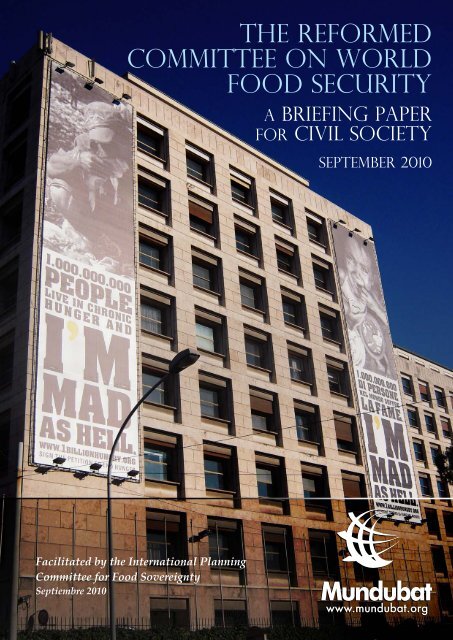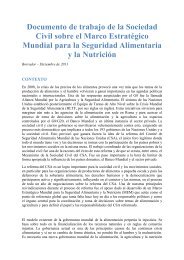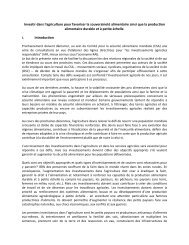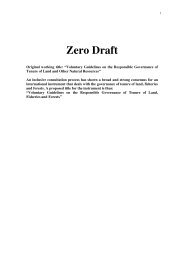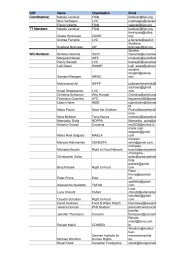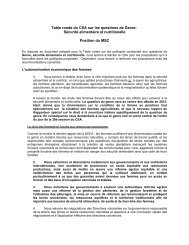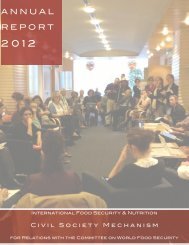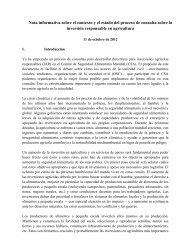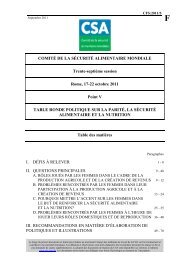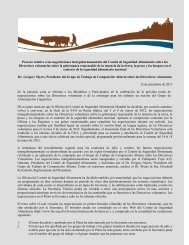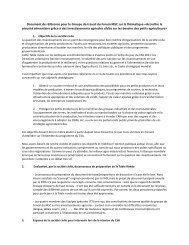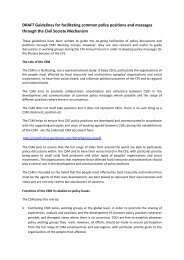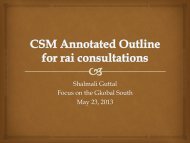The Reformed Committee on Food Security. A briefing paper for ...
The Reformed Committee on Food Security. A briefing paper for ...
The Reformed Committee on Food Security. A briefing paper for ...
You also want an ePaper? Increase the reach of your titles
YUMPU automatically turns print PDFs into web optimized ePapers that Google loves.
<str<strong>on</strong>g>The</str<strong>on</strong>g> global food price crisis of 2007/2008 – plunging another 150 milli<strong>on</strong> people into food insecurityand raising the number of globally malnourished to a staggering 1 billi<strong>on</strong> – emphatically underscoredthe failings of the global food security instituti<strong>on</strong>al architecture. This created a sense of urgency whichled to the creati<strong>on</strong> of new coordinati<strong>on</strong> mechanisms such as the UN Secretary-General’s High LevelTask Force <strong>on</strong> the Global <strong>Food</strong> <strong>Security</strong> Crisis (HLTF); proposals – particularly from G8 countries– <strong>for</strong> new entities such as a Global Partnership <strong>for</strong> Agriculture and <strong>Food</strong> <strong>Security</strong> (GPAFS); and, importantly,to the launch of a process to re<strong>for</strong>m the pre-existing, yet underper<strong>for</strong>ming, <str<strong>on</strong>g>Committee</str<strong>on</strong>g> <strong>on</strong>World <strong>Food</strong> <strong>Security</strong>. Indeed, <strong>for</strong> those seeking transparent and centralised food security governance,providing meaningful participati<strong>on</strong> opportunities <strong>for</strong> civil society and underpinned by the principleof <strong>on</strong>e-country <strong>on</strong>e-vote, it was vital that the resp<strong>on</strong>ses to the food price crisis were focused <strong>on</strong> renewingthe UN architecture, and not in creating new, opaque arrangements (such as the proposedGlobal Partnership). In that meeting room at FAO <strong>on</strong> the 17th October, the loud applause heraldedthat ef<strong>for</strong>ts to ensure exactly this had been successful.<str<strong>on</strong>g>The</str<strong>on</strong>g> re<strong>for</strong>m blueprint of the CFS 2 c<strong>on</strong>tains the outline of a body whose potential <strong>for</strong> the future of foodand agricultural governance and policy-making cannot be overstated. However, the full realisati<strong>on</strong> ofthis potential is dependent up<strong>on</strong> many factors, and a c<strong>on</strong>tinuati<strong>on</strong> and extensi<strong>on</strong> of the CSO engagementthat has been so critical to this process so far is a major part of that. <str<strong>on</strong>g>The</str<strong>on</strong>g> purpose of this <strong>briefing</strong><strong>paper</strong> is to help facilitate that engagement by:• Providing a brief overview of the c<strong>on</strong>text and process in which the CFS was re<strong>for</strong>med(Part 2);• Providing an overview of three different elements of the renewed CFS – its visi<strong>on</strong> androles, actors and mechanisms, and levels and relati<strong>on</strong>s (Part 3);• Highlighting some of the opportunities and challenges <strong>for</strong> civil society within the re-newed CFS (Part 4), and;• Tentatively offering some suggesti<strong>on</strong>s <strong>for</strong> lobbying strategies <strong>for</strong> civil society at thenati<strong>on</strong>al level (Part 5).2 <str<strong>on</strong>g>The</str<strong>on</strong>g> re<strong>for</strong>m document which provides the blueprint <strong>for</strong> the renewed <str<strong>on</strong>g>Committee</str<strong>on</strong>g> <strong>on</strong> World <strong>Food</strong> <strong>Security</strong> (<str<strong>on</strong>g>Committee</str<strong>on</strong>g><strong>on</strong> World <strong>Food</strong> <strong>Security</strong> (2009) “Re<strong>for</strong>m of the <str<strong>on</strong>g>Committee</str<strong>on</strong>g> <strong>on</strong> World <strong>Food</strong> <strong>Security</strong>: Final Versi<strong>on</strong>”, FAO Reference:CFS:2009/2) can be located here: http://cso4cfs.org/document-library/4
This growth of instituti<strong>on</strong>s has led to a complicated picture <strong>for</strong> global food and agricultural governanceand policy-making. <str<strong>on</strong>g>The</str<strong>on</strong>g> sheer range of internati<strong>on</strong>al entities of relevance to food and agriculturetoday is suggested by the fact that when UN Secretary-General Ban Ki-Mo<strong>on</strong> c<strong>on</strong>vened a High LevelTask Force to resp<strong>on</strong>d to the 2007/2008 food price crisis, it counted no less than twenty different bodieswithin its participants 5 .<str<strong>on</strong>g>The</str<strong>on</strong>g> problem of instituti<strong>on</strong>al fragmentati<strong>on</strong> is compounded by fundamental disagreements at the globallevel <strong>on</strong> how best to attain food security. <str<strong>on</strong>g>The</str<strong>on</strong>g>se disagreements reflect ideology, interest, disciplinaryand instituti<strong>on</strong>al locati<strong>on</strong>, and – of fundamental importance in the case of small scale producersand providers – experience. Whilst, in principle, bodies such as the C<strong>on</strong>ference of FAO are supposedto provide global level spaces in which to discuss, deliberate, and reflect up<strong>on</strong> the merits of the differentfood and agricultural policies, in practice this has not happened 6 . <str<strong>on</strong>g>The</str<strong>on</strong>g>re<strong>for</strong>e, prior to the CFSre<strong>for</strong>m, there existed no effective space <strong>for</strong> food security policy dialogue at the global level.To a large extent this reflects the hegem<strong>on</strong>y of neoliberal thinking which has dominated – and stillexerts a str<strong>on</strong>g influence over - development policy and its related fields <strong>for</strong> the greater part of thelast 30 years. However, with many of the fundamental premises of neoliberalism now being routinelycalled into questi<strong>on</strong> even by those who were <strong>on</strong>ce at the vanguard of their advocacy, and a range ofcrises associated with the dysfuncti<strong>on</strong>ality of unregulated markets, there has been a growing andwidespread recogniti<strong>on</strong> of the need <strong>for</strong> a global food security policy dialogue. <str<strong>on</strong>g>The</str<strong>on</strong>g> oppositi<strong>on</strong> to neoliberalismfiercely dem<strong>on</strong>strated by an organized global civil society has of course been an importantpart of this c<strong>on</strong>text.Four important dynamics then of the historical c<strong>on</strong>text <strong>for</strong> global food security activity are:• An absence of effective political will;• A fragmented and complex instituti<strong>on</strong>al envir<strong>on</strong>ment;• <str<strong>on</strong>g>The</str<strong>on</strong>g> dominance and subsequent calling into questi<strong>on</strong> of neoliberalism;• <str<strong>on</strong>g>The</str<strong>on</strong>g> emergence of an organised and effective global civil society.5 <str<strong>on</strong>g>The</str<strong>on</strong>g> full list of HLTF members includes representatives of the following instituti<strong>on</strong>s: <strong>Food</strong> and Agriculture Organizati<strong>on</strong>(FAO), Internati<strong>on</strong>al Fund <strong>for</strong> Agricultural Development (IFAD), Office of the High Commissi<strong>on</strong>er <strong>for</strong> HumanRights (OHCHR), Office <strong>for</strong> the Coordinati<strong>on</strong> of Humanitarian Affairs (OCHA) ,Internati<strong>on</strong>al Labour Organizati<strong>on</strong>(ILO), Internati<strong>on</strong>al M<strong>on</strong>etary Fund (IMF), UN Office of the High Representative <strong>for</strong> the Least Developed Countries,Landlocked Developing Countries and Small Island Developing States (OHRLLS), UN C<strong>on</strong>ference <strong>on</strong> Trade andDevelopment (UNCTAD), UN Development Programme (UNDP), UN Envir<strong>on</strong>ment Programme (UNEP), Office of theUN High Commissi<strong>on</strong>er <strong>for</strong> Refugees (UNHCR), World Bank, World <strong>Food</strong> Programme (WFP), World Health Organizati<strong>on</strong>(WHO), World Trade Organizati<strong>on</strong> (WTO), Department of Ec<strong>on</strong>omic and Social Affairs (DESA), Department ofPolitical Affairs (DPA), Department of Public In<strong>for</strong>mati<strong>on</strong> (DPI), Department of Peacekeeping Operati<strong>on</strong>s (DPKO).6 See: FAO (2007) “Report of the Independent External Evaluati<strong>on</strong> of the <strong>Food</strong> and Agricultural Organizati<strong>on</strong>of the United Nati<strong>on</strong>s”, particularly “Chapter Four: Governance”. Available at: http://www.fao.org/pbe/pbee/en/219/index.html8
In June 2008 French President Sarkozy, when addressing the High Level C<strong>on</strong>ference <strong>on</strong> World <strong>Food</strong><strong>Security</strong> at FAO proposed the creati<strong>on</strong> of a Global Partnership <strong>for</strong> Agriculture and <strong>Food</strong> <strong>Security</strong>with three key pillars: internati<strong>on</strong>al policy coordinati<strong>on</strong>; an internati<strong>on</strong>al group of experts (based inFAO); and a world financial facility <strong>for</strong> food security (based at IFAD). This became a provocative andc<strong>on</strong>troversial idea, largely due to the fact that it was never clearly defined by those who advocatedit, and seemed to mean something completely different <strong>for</strong> each different actor. For some there was afear that this Partnership would involve moving food security resp<strong>on</strong>sibility outside of the UN systemand increasing the role of the private sector, but at the various different meetings and discussi<strong>on</strong>sin which the attempt was made to bring this idea to life a lack of c<strong>on</strong>sensus am<strong>on</strong>gst its advocatesand stiff oppositi<strong>on</strong> from a broad range of actors – including a str<strong>on</strong>g and well organized civil society- meant that its momentum was more or less redirected to the CFS re<strong>for</strong>m process.In April 2008 to July 2009 at a series of their meetings, G8 countries had food security <strong>on</strong> their agenda,and made a number of declarati<strong>on</strong>s and financial commitments in the name of addressing global foodinsecurity 8 .Whilst the above selective list shows how the food price crisis resulted in a significant outburst of foodsecurity related activity at a global level, which <strong>for</strong> many marked a l<strong>on</strong>g overdue return of the problemof global hunger to the attenti<strong>on</strong> of the internati<strong>on</strong>al community, many elements of this activitywere regarded as aggravating or compounding the historical weaknesses of the global food securitysystem outlined above. For some, the lack of transparency and the exclusiveness of these processeswas a major c<strong>on</strong>cern. From this perspective both the threat they seemed to pose to the principle of <strong>on</strong>ecountry-<strong>on</strong>e vote, and their inability or reluctance to heed the voices of rural peoples in their <strong>for</strong>mulati<strong>on</strong>swere profound weaknesses. For others, the further fragmentati<strong>on</strong> that seemed to be suggestedby, <strong>for</strong> example, the launch of a completely new initiative such as the Global Partnership, decreasednot increased the likelihood of system effectiveness. And <strong>for</strong> others some of the commitments thatrepeated throughout the declarati<strong>on</strong>s seemed less to be the product of bottom up needs assessmentand more coloured by ideology or nati<strong>on</strong>al interest.In the wake of these reservati<strong>on</strong>s, and following <strong>on</strong> from the momentum of a deep and thoroughgoing re<strong>for</strong>m process directed at its host instituti<strong>on</strong> - the FAO - in October 2008 member states agreedto embark <strong>on</strong> a process to re<strong>for</strong>m the <str<strong>on</strong>g>Committee</str<strong>on</strong>g> <strong>on</strong> World <strong>Food</strong> <strong>Security</strong>. At the time some l<strong>on</strong>g-term<strong>on</strong>lookers felt that this would be a slow process, but this proved not to be the case, with the discussi<strong>on</strong>sand negotiati<strong>on</strong>s being brought in fact to a successful c<strong>on</strong>clusi<strong>on</strong> by October of 2009.8 See July 2008 G8 Hokkaido Toyako Leaders Statement <strong>on</strong> Global <strong>Food</strong> <strong>Security</strong> http://www.mofa.go.jp/policy/ec<strong>on</strong>omy/summit/2008/doc/doc080709_04_en.htmlAnd: July 2009 G8 L’Aquila Joint Statement <strong>on</strong> Global <strong>Food</strong> <strong>Security</strong> http://www.g8summit.it/G8/Home/Summit/G8-G8_Layout_locale-1199882116809_Atti.htm10
<str<strong>on</strong>g>The</str<strong>on</strong>g> C<strong>on</strong>tact Group Process:Producing a Blueprint <strong>for</strong> CFS Re<strong>for</strong>m<str<strong>on</strong>g>The</str<strong>on</strong>g> mechanism <strong>for</strong> producing the re<strong>for</strong>m document was a C<strong>on</strong>tact Group especially established bythe Bureau of the CFS under the visi<strong>on</strong>ary leadership of its Chair Maria Del Carmen Squeff, AlternatePermanent Representative of Argentina to FAO. In a departure from the normal working practicesof the CFS (and other inter-governmental bodies) the C<strong>on</strong>tact Group provided unprecedented participati<strong>on</strong>opportunities <strong>for</strong> civil society, who were more or less entitled to the same degree of accessand participati<strong>on</strong> as member states - tabling and resp<strong>on</strong>ding to re<strong>for</strong>m proposals through the C<strong>on</strong>tactGroup’s website and attending and intervening at the Rome meetings. Though civil society were notthe <strong>on</strong>ly actors invited into the extended C<strong>on</strong>tact Group, and the full list of participants also includedother UN bodies and, in theory at least, the private sector, it was widely recognised by member statesthat civil society participati<strong>on</strong> was fundamental to the successful c<strong>on</strong>clusi<strong>on</strong> of the process and thevisi<strong>on</strong> of the final document.From its first meeting in April 2009 to the adopti<strong>on</strong> of the re<strong>for</strong>m document in October later thatyear, the C<strong>on</strong>tact Group met physically a total of seven times, with much website mediated activityin-between. During this time the re<strong>for</strong>m document went through a number of different drafts, as C<strong>on</strong>tactGroup participants worked within four Working Groups to c<strong>on</strong>sider 1) the Role and Visi<strong>on</strong> of therenewed CFS; 2) its Membership and Decisi<strong>on</strong> Taking; 3) its Mechanisms and Procedures, and; 4) itsHigh Level Panel of Experts. Within the c<strong>on</strong>text of these working groups discussi<strong>on</strong> and negotiati<strong>on</strong>focused implicitly up<strong>on</strong> such questi<strong>on</strong>s as:• Who should be entitled to participate in the renewed CFS and what should their participati<strong>on</strong>rights be?• What roles should the CFS play within the global food security “system” and how authoritativeshould it be?• With which other parts of the internati<strong>on</strong>al system should the CFS be related, andhow?• What “mechanisms” does the renewed CFS need in order to be able to fulfill its roles?11
Whilst the success of the IPC in the C<strong>on</strong>tact Group was directly related to their c<strong>on</strong>siderable experienceand organisati<strong>on</strong> (having clear positi<strong>on</strong>s and knowing how to articulate them), that there wasa broad degree of harm<strong>on</strong>y am<strong>on</strong>gst the civil society actors involved in the C<strong>on</strong>tact Group was alsoan advantage, and a strengthened working relati<strong>on</strong>ship with Internati<strong>on</strong>al NGOs Acti<strong>on</strong>-Aid andOxfam in particular has been – and c<strong>on</strong>tinues to be – very productive. However, across civil societymore generally there is still a tensi<strong>on</strong> between those who believe that the best way of attaining foodsecurity is to assert the agency (through the provisi<strong>on</strong> of participati<strong>on</strong> opportunities) <strong>for</strong> “those mostaffected by food insecurity” and those who profess to work <strong>on</strong> behalf of this c<strong>on</strong>stituency, mainlythrough their advocacy work. Following its re<strong>for</strong>m the CFS has become a much more attractive andrelevant space <strong>for</strong> all CSOs whose work is relevant to food security, which threatens to make this tensi<strong>on</strong>more relevant and there have been signs that this is perhaps the case.<str<strong>on</strong>g>The</str<strong>on</strong>g> c<strong>on</strong>clusi<strong>on</strong> of the C<strong>on</strong>tact Group process in October 2009 represented a significant victory <strong>for</strong>those who sought to channel the resp<strong>on</strong>ses to the food crisis into the UN system. It also resulted inthe producti<strong>on</strong> of a re<strong>for</strong>m document outlining the c<strong>on</strong>tours and resp<strong>on</strong>sibilities of a body whosepotential significance <strong>for</strong> global food security governance cannot be overstated. <str<strong>on</strong>g>The</str<strong>on</strong>g> following secti<strong>on</strong>will outline the key features of this renewed body.13
3. THE RENEWED CFS: VISION AND ROLES;ACTORS AND MECHANISMS; LEVELS AND RELATIONSI. THE VISION AND ROLES OF THE RENEWED CFSOverall Visi<strong>on</strong><str<strong>on</strong>g>The</str<strong>on</strong>g> aspirati<strong>on</strong>s <strong>for</strong> the renewed CFS are stated very clearly <strong>on</strong> the first page of the re<strong>for</strong>m document:<str<strong>on</strong>g>The</str<strong>on</strong>g> re<strong>for</strong>ms are designed to redefine the CFS’ visi<strong>on</strong> and role to focus <strong>on</strong> the key challengesof eradicating hunger; expanding participati<strong>on</strong> in CFS to ensure that voices of all relevantstakeholders are heard in the policy debate <strong>on</strong> food and agriculture; adopt its rules and procedureswith the aim to become the central United Nati<strong>on</strong>s political plat<strong>for</strong>m dealing with foodsecurity and nutriti<strong>on</strong>; strengthening its linkages with regi<strong>on</strong>al, nati<strong>on</strong>al, and local levels;and supporting CFS discussi<strong>on</strong>s with structured expertise through the creati<strong>on</strong> of a High LevelPanel of Experts (HLPE) so that the decisi<strong>on</strong>s and the work of the CFS are based <strong>on</strong> hardevidence and state of the art knowledge [Emphasis added].(CFS:2009/2: Paragraph 2).This brief paragraph makes reference to a number of key elements the presence of which is whatendows the renewed CFS with its potential. Whether or not this potential is realised depends <strong>on</strong> theextent to which – through implementati<strong>on</strong> of the re<strong>for</strong>m document - the CFS is able to realise theseelements both individually and collectively.<str<strong>on</strong>g>The</str<strong>on</strong>g>se elements are:• Political centrality - <str<strong>on</strong>g>The</str<strong>on</strong>g> renewed CFS is intended to be the central political space withinthe global food security architecture. It is the place, there<strong>for</strong>e, where public authorityover the global food security agenda is to be located. This is in c<strong>on</strong>trast to the presentsituati<strong>on</strong> where public authority is weak and fragmented.• Inclusivity - <str<strong>on</strong>g>The</str<strong>on</strong>g> CFS provides unprecedented participati<strong>on</strong> opportunities <strong>for</strong> a rangeof stakeholders “particularly those most affected by food insecurity” (CFS:2009/2: Paragraph7). This inclusivity extends to all aspects, periods, and levels of the work undertakenby the CFS.• Policy orientati<strong>on</strong> - <str<strong>on</strong>g>The</str<strong>on</strong>g> CFS aspires to impact up<strong>on</strong> policy. It seeks to be c<strong>on</strong>crete andacti<strong>on</strong> oriented. It seeks to make a tangible c<strong>on</strong>tributi<strong>on</strong> towards the food security agenda.• Linking the different levels - Both with regards to its “inputs” and its “outputs” theCFS aspires to be meaningfully and dynamically c<strong>on</strong>nected with all levels of food securityactivity, especially the “reality <strong>on</strong> the ground” (CFS:2009/2: Paragraph 23). This14
multi-level dynamic means that the renewed CFS will relate to all the different levels ina two-way relati<strong>on</strong>ship, taking inputs from each of the different levels, and producingoutputs to shape acti<strong>on</strong> at these levels.Am<strong>on</strong>g those important elements not menti<strong>on</strong>ed in this paragraph we might also add:• <str<strong>on</strong>g>The</str<strong>on</strong>g> Right to <strong>Food</strong> - <str<strong>on</strong>g>The</str<strong>on</strong>g> renewed CFS makes explicit menti<strong>on</strong> to the Right to <strong>Food</strong>, andasserts the realisati<strong>on</strong> of this right as a key objective.Roles<str<strong>on</strong>g>The</str<strong>on</strong>g> renewed CFS has been assigned six fundamental roles, to be implemented within sets of threein a two-phase process. This two-phase process was designed so that the CFS could embark <strong>on</strong> whatwere regarded by some member states as its less c<strong>on</strong>troversial work (the roles assigned within phase<strong>on</strong>e) without getting bogged down in negotiati<strong>on</strong>s over its other roles (those within phase two).Because of the interc<strong>on</strong>nectedness of these roles, however, we can anticipate – and this seems to beborne out by the current status of the implementati<strong>on</strong> process – that in practice it will be difficult toseparate them.<str<strong>on</strong>g>The</str<strong>on</strong>g> six roles are:To be implemented within the first phase (commencing October 2009)I. Coordinati<strong>on</strong> at global level – <str<strong>on</strong>g>The</str<strong>on</strong>g> CFS re<strong>for</strong>m document describes this role as to “[p]rovide a plat<strong>for</strong>m <strong>for</strong> discussi<strong>on</strong> and coordinati<strong>on</strong> to strengthen collaborative acti<strong>on</strong>am<strong>on</strong>g governments, regi<strong>on</strong>al organizati<strong>on</strong>s, internati<strong>on</strong>al organizati<strong>on</strong>s and agencies,NGOs, CSOs, food organizati<strong>on</strong>s, and other relevant stakeholders” (CFS: 2009/2: Paragraph5.i).II. Policy c<strong>on</strong>vergence – “Promote greater policy c<strong>on</strong>vergence and coordinati<strong>on</strong>, includingthrough the development of internati<strong>on</strong>al strategies and voluntary guidelines <strong>on</strong>food security and nutriti<strong>on</strong>” (CFS: 2009/2: Paragraph 5.ii).III. Support and advice to countries and regi<strong>on</strong>s – “At country and/or regi<strong>on</strong> request,facilitate support and/or advice in the development, implementati<strong>on</strong>, m<strong>on</strong>itoring andevaluati<strong>on</strong> of their nati<strong>on</strong>ally and regi<strong>on</strong>ally owned plans of acti<strong>on</strong> <strong>for</strong> the eliminati<strong>on</strong> ofhunger, the achievement of food security and the practical applicati<strong>on</strong>s of the “VoluntaryGuidelines <strong>for</strong> the Right to <strong>Food</strong>” that shall be based <strong>on</strong> the principles of participati<strong>on</strong>,transparency and accountability.” (CFS: 2009/2: Paragraph 5.iii).15
To be implemented within the sec<strong>on</strong>d phase (elements of which will commence October 2010)• Coordinati<strong>on</strong> at nati<strong>on</strong>al and regi<strong>on</strong>al levels – <str<strong>on</strong>g>The</str<strong>on</strong>g> CFS re<strong>for</strong>m documents describesthis role as to “[s]erve as a plat<strong>for</strong>m to promote greater coordinati<strong>on</strong> and alignment ofacti<strong>on</strong>s in the field, encourage more efficient use of resources and identify resource gaps.”(CFS: 2009/2: Paragraph 6.i).• Promote accountability and share best practices at all levels – “<str<strong>on</strong>g>The</str<strong>on</strong>g> CFS should helpcountries and regi<strong>on</strong>s, as appropriate, address the questi<strong>on</strong>s of whether objectives arebeing achieved and how food insecurity and malnutriti<strong>on</strong> can be reduced more quicklyand effectively.” (CFS: 2009/2: Paragraph 6.ii).• Develop a Global Strategic Framework <strong>for</strong> food security and nutriti<strong>on</strong> – “in order toimprove coordinati<strong>on</strong> and guide synchr<strong>on</strong>ized acti<strong>on</strong> by a wide range of stakeholders.”(CFS: 2009/2: Paragraph 6.iii).It is clear that – although they were assigned to two separate phases during the re<strong>for</strong>m discussi<strong>on</strong>s– there is potentially a lot of overlap between these roles. For instance, the first role in phase One, “Coordinati<strong>on</strong>at a global level”, c<strong>on</strong>sists of providing a “plat<strong>for</strong>m <strong>for</strong> discussi<strong>on</strong> and coordinati<strong>on</strong> to strengthencollaborative acti<strong>on</strong>”. Collaborative acti<strong>on</strong> seems already to imply some sort of agreement, or process ofreaching agreement about what it is that needs to be d<strong>on</strong>e. This there<strong>for</strong>e seems to overlap – despitetheir apparent separati<strong>on</strong> – with the third role in phase Two “Develop a Global Strategic Framework”, theobjective of which is to “improve coordinati<strong>on</strong> and guide synchr<strong>on</strong>ized acti<strong>on</strong>”. Additi<strong>on</strong>ally, the sec<strong>on</strong>drole of Phase Two “Promote accountability and share best practice” requires “developing an innovative mechanism,including the definiti<strong>on</strong> of comm<strong>on</strong> indicators, to m<strong>on</strong>itor progress” (CFS: 2009/2: Paragraph 6.ii).<str<strong>on</strong>g>The</str<strong>on</strong>g> producti<strong>on</strong> of “comm<strong>on</strong> indicators” again presupposes or implies agreement or c<strong>on</strong>vergenceabout what it is that needs to be d<strong>on</strong>e, and so we can say that from the outset of the CFS’s work programme- and c<strong>on</strong>tinuing all the way through the implementati<strong>on</strong> period – <strong>on</strong>e of the central pillarsof the CFS’s work will be to seek to generate agreement about what it is that needs to be d<strong>on</strong>e to achieve foodsecurity, to translate this agreement into general principles and policies <strong>for</strong> coordinated acti<strong>on</strong>, and to m<strong>on</strong>itortheir implementati<strong>on</strong>.16
II. ACTORS AND MECHANISMS WITHIN THE REFORMED CFSIn the pre-re<strong>for</strong>m CFS civil society had already been recognised as having a central role to play in them<strong>on</strong>itoring of states’ implementati<strong>on</strong> of the World <strong>Food</strong> Summit’s Plan of Acti<strong>on</strong>. However the renewedCFS has extended unprecedented participati<strong>on</strong> opportunities to a wider range of actors resultingin a body whose compositi<strong>on</strong> now extends well bey<strong>on</strong>d member states. Indeed, during the C<strong>on</strong>tactGroup process civil society actors such as the IPC were c<strong>on</strong>cerned that the list of those entitledto participate within the CFS would be too l<strong>on</strong>g, and crowd out the voices of smallholder producers.This c<strong>on</strong>cern however – whilst recognised – was not validated by governments, who finally agreed toinclude IFIs and private philanthropic foundati<strong>on</strong>s.As noted above, at the global level the CFS is divided into two main areas of work – the Plenary andthe intersessi<strong>on</strong>al work, and there are three main categories of actors who participate in this work.CFS actors: Members<str<strong>on</strong>g>The</str<strong>on</strong>g> first category of actors is Members – <str<strong>on</strong>g>The</str<strong>on</strong>g>se are states that are members of the FAO and the UN.According to the re<strong>for</strong>m document:Members take part fully in the work of the <str<strong>on</strong>g>Committee</str<strong>on</strong>g> with the right to intervene in plenaryand breakout discussi<strong>on</strong>s, approve meeting documents and agendas, submit and present documentsand <strong>for</strong>mal proposals, and interact with the Bureau during the intersessi<strong>on</strong>al period. Voting and decisi<strong>on</strong>taking is the exclusive prerogative of Members, including drafting the final report of CFS Plenarysessi<strong>on</strong>s. [Emphasis added].(CFS: 2009/2: Paragraph: 10).17
<str<strong>on</strong>g>The</str<strong>on</strong>g> Strategic Framework of the CFSDuring the C<strong>on</strong>tact Group negotiati<strong>on</strong>s civil society – particularly the IPC – attached aspecial importance to the CFS being assigned the role of generating a Global StrategicFramework <strong>for</strong> food security and nutriti<strong>on</strong>. This was eventually assigned to Phase IIof the implementati<strong>on</strong> process, though in practice the definiti<strong>on</strong> of comm<strong>on</strong> principlesof acti<strong>on</strong> underpins the CFS’s work from the outset, and this is reflected perhaps by thefact that the process of defining the Strategic Framework has already tentatively begunwith the producti<strong>on</strong> of a couple of c<strong>on</strong>cept notes, and the provisi<strong>on</strong>al scheduling ofdiscussi<strong>on</strong> <strong>on</strong> the Framework <strong>for</strong> the next CFS Plenary – the 36th (11-16th October).<str<strong>on</strong>g>The</str<strong>on</strong>g> re<strong>for</strong>m document is short <strong>on</strong> details about the Strategic Framework, simply statingthat its goal is “to improve coordinati<strong>on</strong> and guide synchr<strong>on</strong>ized acti<strong>on</strong> by a wide rangeof stakeholders.” (CFS: 2009/2: Paragraph 6.iii). It also adds that the Framework isTo be flexible so that it can be adjusted as priorities change;To be built up<strong>on</strong> “existing frameworks such as the UN’s Comprehensive Framework<strong>for</strong> Acti<strong>on</strong> (CFA), the Comprehensive Agriculture Development Programme(CAADP), and the Voluntary Guidelines to Support the ProgressiveRealisati<strong>on</strong> of the Right to Adequate <strong>Food</strong>.” (CFS: 2009/2: Paragraph 6.iii).During the C<strong>on</strong>tact Group process – and in the c<strong>on</strong>cept notes – the issue of how theStrategic Framework should relate to these existing frameworks was raised, with theIPC calling <strong>for</strong> an evaluati<strong>on</strong> of, <strong>for</strong> instance, the CFA as part of this process. <str<strong>on</strong>g>The</str<strong>on</strong>g> processof defining the Strategic Framework will be a test case <strong>for</strong> determining how farthe CFS can go towards realizing its visi<strong>on</strong>ary potential. As stated earlier in this <strong>paper</strong>,inclusivity and linkages with the “reality <strong>on</strong> the ground” are two principles right atthe heart of the renewed CFS. <str<strong>on</strong>g>The</str<strong>on</strong>g> challenge will be to design a process <strong>for</strong> <strong>for</strong>mulatingthe Global Strategic Framework which meaningfully realises both. We can anticipatethat this will pose big challenges both to those charged with designing and managingthe process and those – civil society in particular – without whose c<strong>on</strong>tributi<strong>on</strong> theprocess will be empty.18
CFS actors: Participants<str<strong>on</strong>g>The</str<strong>on</strong>g> sec<strong>on</strong>d category is Participants – It is within this category that the unprecedented inclusivityof the renewed CFS becomes visible. This is expressed both through the breadthof actors included within this grouping, and also the fact that – with the excepti<strong>on</strong> ofdecisi<strong>on</strong>-making authority – Participants enjoy participati<strong>on</strong> rights more or less equal tothose enjoyed by member states. That is the right to intervene in plenary and breakoutdiscussi<strong>on</strong>s, approve meeting documents and agendas, submit and present documentsand <strong>for</strong>mal proposals. <str<strong>on</strong>g>The</str<strong>on</strong>g>y are also asked to:Commit regularly to intersessi<strong>on</strong>al activities of the <str<strong>on</strong>g>Committee</str<strong>on</strong>g> at all levels and interactwith the Bureau during the intersessi<strong>on</strong>al period through the Advisory Group establishedby the Bureau.(CFS:2009/2: Paragraph 12).<str<strong>on</strong>g>The</str<strong>on</strong>g> category of Participants is divided into five sub-categories, each representing a c<strong>on</strong>stituencyof actors whose participati<strong>on</strong> was deemed within the C<strong>on</strong>tact Group processcentral to the securing of food security and the eliminati<strong>on</strong> of hunger. <str<strong>on</strong>g>The</str<strong>on</strong>g>se five subcategoriesare:I. Representatives of UN agencies and bodies with a specific mandate in thefield of food security and nutriti<strong>on</strong>;II. Civil society and n<strong>on</strong>-governmental organizati<strong>on</strong>s and their networks withstr<strong>on</strong>g relevance to issues of food security and nutriti<strong>on</strong>.III. Internati<strong>on</strong>al agricultural research systems;IV. Internati<strong>on</strong>al and regi<strong>on</strong>al Financial Instituti<strong>on</strong>s, regi<strong>on</strong>al developmentbanks, and the World Trade Organizati<strong>on</strong> (WTO);V. Representatives of private sector associati<strong>on</strong>s and private philanthropicfoundati<strong>on</strong>s active in the areas of c<strong>on</strong>cern to the <str<strong>on</strong>g>Committee</str<strong>on</strong>g>.19
CSOs are there<strong>for</strong>e included within the CFS under the class of Participants, there being five subcategoriesof participants in total. Within Category ii: “Civil society and n<strong>on</strong>-governmental organizati<strong>on</strong>s”the CFS re<strong>for</strong>m document goes into more detail, specifying that inclusi<strong>on</strong> within this categoryneeds “particular attenti<strong>on</strong> to organizati<strong>on</strong>s representing”:• Smallholder firmly farmers;• Artisanal fisherfolk;• Herders/pastoralists;• Landless;• Urban poor;• Agricultural and food workers;• Women;• Youth;• C<strong>on</strong>sumers;• Indigenous Peoples, and;• Internati<strong>on</strong>al NGOs whose mandatesand activities are c<strong>on</strong>centrated in areasof c<strong>on</strong>cern to the <str<strong>on</strong>g>Committee</str<strong>on</strong>g>.CFS Actors: Observers<str<strong>on</strong>g>The</str<strong>on</strong>g> final category of participants within the CFS is Observers – This category includes regi<strong>on</strong>al,nati<strong>on</strong>al, and local actors including regi<strong>on</strong>al associati<strong>on</strong>s of countries; CSOs/NGOs other than thoseattending as participants; and other networks and associative organizati<strong>on</strong>s. <str<strong>on</strong>g>The</str<strong>on</strong>g>se actors can apply<strong>for</strong> Observer status <strong>for</strong> specific items or entire sessi<strong>on</strong>s, but have to be invited to speak by the Chair.States Still the Central ActorsPrior to its re<strong>for</strong>m, whilst the CFS recognised the value of the role to be played by civil society in, <strong>for</strong>example, m<strong>on</strong>itoring states’ implementati<strong>on</strong> of the food security commitments they made in globalsummits, this role – and the participati<strong>on</strong> rights civil society enjoyed to do it - were marginal to thatassigned to states. It is clear from the categories above that the renewed CFS has extended unprecedentedparticipati<strong>on</strong> opportunities to civil society, but also a much wider group of actors.However, it is important to note that the CFS c<strong>on</strong>tinues to be an intergovernmental body, and recognisesmember states as the principle actors in the eliminati<strong>on</strong> of hunger and attainment of food security.It does this in a number of ways:• Firstly, it assigns decisi<strong>on</strong>-making power within the re<strong>for</strong>med CFS to member statesal<strong>on</strong>e (Paragraph 10);• Sec<strong>on</strong>dly, it asserts the importance of country owned plans <strong>for</strong> tackling food insecurity,(Paragraph 5.iii), and;• Thirdly, it holds states accountable <strong>for</strong> addressing food insecurity and m<strong>on</strong>itors theirprogress towards this (Paragraph 6.ii).20
<str<strong>on</strong>g>The</str<strong>on</strong>g> All Year Work Programme of the CFS:Plenary and Intersessi<strong>on</strong>al ActivityGiven its expanded roles the CFS now engages in an all-year programme of work whichincludes its annual meetings – <str<strong>on</strong>g>The</str<strong>on</strong>g> Plenary; and the work c<strong>on</strong>ducted between Plenaries toprepare, gather in<strong>for</strong>mati<strong>on</strong>, disseminate outputs etc – its intersessi<strong>on</strong>al activity.<str<strong>on</strong>g>The</str<strong>on</strong>g> Plenary: This is the annual meeting of the CFS – and the main event in the CFS calendar.According to the re<strong>for</strong>m document the Plenary is the central body <strong>for</strong> decisi<strong>on</strong>-taking,debate, coordinati<strong>on</strong>, less<strong>on</strong>-learning and c<strong>on</strong>vergence by all stakeholders at global level <strong>on</strong>all issues pertaining to food security and nutriti<strong>on</strong> and <strong>on</strong> the implementati<strong>on</strong> of the VoluntaryGuidelines to Support the Progressive Realizati<strong>on</strong> of the Right to Adequate <strong>Food</strong> in theC<strong>on</strong>text of Nati<strong>on</strong>al <strong>Food</strong> <strong>Security</strong>.(CFS:2009/2: Paragraph 20).<str<strong>on</strong>g>The</str<strong>on</strong>g> Plenary is open to all three categories of CFS participants: Members, Participants, andObservers, each category however varying in terms of the participati<strong>on</strong> rights enjoyed byits members. <str<strong>on</strong>g>The</str<strong>on</strong>g> next plenary meeting of the CFS – the 36th in its history – will be at FAOheadquarters, Rome, from October 11th – 16th, 2010.Intersessi<strong>on</strong>al activity: <str<strong>on</strong>g>The</str<strong>on</strong>g> intersessi<strong>on</strong>al work of the CFS is not spelled out exactly withinthe re<strong>for</strong>m document, but we can anticipate that, from a civil society perspective, it wouldinclude:Bringing awareness of developments impacting up<strong>on</strong> food security (e.g., “land grabbing”)to CFS member states;Proposing and commenting <strong>on</strong> Plenary preparati<strong>on</strong>s (agendas, <strong>briefing</strong> documents,proposals <strong>for</strong> the HLPE etc);M<strong>on</strong>itoring the implementati<strong>on</strong> of CFS outcomes at local, nati<strong>on</strong>al and regi<strong>on</strong>al,and global levels.21
CFS Relati<strong>on</strong>s with different levelsAgain, using the distincti<strong>on</strong> between CFS inputs and CFS outputs, the re<strong>for</strong>m document proposesthat the CFS relate to the different levels in the following indicative ways:Global LevelAs shown above, the CFS establishes linkages at the global level through its (five categories of) participants,who are both able to c<strong>on</strong>tribute to inputs and asked to take note of its outputs. .It also relates to a global network of experts through its High Level Panel of Experts. And it also relates,through its reporting, to FAO C<strong>on</strong>ference (the main governing body in FAO) and the UN GeneralAssembly through its Ec<strong>on</strong>omic And Social Council (ECOSOC).<str<strong>on</strong>g>The</str<strong>on</strong>g> CFS: Key Mechanisms I<str<strong>on</strong>g>The</str<strong>on</strong>g> annual meeting of the CFS is the Plenary but aside from this body there a number of otherimportant mechanisms that facilitate the activity of the Membership and Participants withinthe CFS, particularly during the intersessi<strong>on</strong>al period.<str<strong>on</strong>g>The</str<strong>on</strong>g> Bureau represents the broader membership (member states) of the CFS between plenarysessi<strong>on</strong>s. It ensures coordinati<strong>on</strong> am<strong>on</strong>g all actors and advances tasks in preparati<strong>on</strong> <strong>for</strong> CFSplenary sessi<strong>on</strong>s. <str<strong>on</strong>g>The</str<strong>on</strong>g> Bureau has a Chairpers<strong>on</strong> (Noel de Luna of the Philippines), and 12members. Members of the Bureau serve a two year term.<str<strong>on</strong>g>The</str<strong>on</strong>g> Advisory Group provides a bridge between Participants and the Bureau, and its functi<strong>on</strong>is to “provide input to the Bureau regarding the range of tasks which the CFS Plenary hasinstructed it to per<strong>for</strong>m.” (CFS, 2009/2: Paragraph 32). <str<strong>on</strong>g>The</str<strong>on</strong>g> Advisory Group is not to exceedthe numbers of the Bureau and its 13 members serve the same term as the Bureau – two years.Membership of the Advisory Group is comprised as follows, following its divisi<strong>on</strong> into fivecategories:· Five representatives from Category 1 - UN bodies and agencies with mandates in food securityand nutriti<strong>on</strong>FAO, Hafez Ghanem, Assistant Director General, Ec<strong>on</strong>omic and Social Department.WFP, Mohamed El-Kouhene, Deputy Director, Multilateral and NGOs Relati<strong>on</strong>s Divisi<strong>on</strong>.IFAD, Jean-Philippe Audinet, Operati<strong>on</strong>al Policy and Technical Advisory Divisi<strong>on</strong>.Right-to-<strong>Food</strong>, Olivier De Schutter, Special Rapportuer <strong>on</strong> the right to food - Office of23
the High Commissi<strong>on</strong>er <strong>for</strong> Human Rights.High Level Task Force, David Nabarro.· Four representatives from Category 2 - CSOs and NGOsIPC, Beatriz Gasco, IPC Secretariat.MIJARC, George Dix<strong>on</strong> Fernandez, President.Oxfam, Chris Leather, <strong>Food</strong> & Agriculture Policy Adviser.ROPPA, Mamadou Cissokho, H<strong>on</strong>orary President.· One representative from Category 3 - Internati<strong>on</strong>al Agricultural Research BodiesBioversity Internati<strong>on</strong>al, Emile Fris<strong>on</strong>, Director General.· One representative from Category 4 - Internati<strong>on</strong>al Financial and Trade Instituti<strong>on</strong>sWorld Bank, Juergen Voegele, Director, Agriculture and Rural Development Department.· Two representatives from Category 5 - Private Sector/Philanthropic Foundati<strong>on</strong>sBill & Melinda Gates Foundati<strong>on</strong>, Prabhu Pingali, Head of Agricultural Policy andStatistics, Agriculture Development Divisi<strong>on</strong>.Internati<strong>on</strong>al Agri-<strong>Food</strong> Network, Keith J<strong>on</strong>es.Regi<strong>on</strong>al level<str<strong>on</strong>g>The</str<strong>on</strong>g> CFS will attempt to draw inputs from and disseminate outputs to the regi<strong>on</strong>al level through:• <str<strong>on</strong>g>The</str<strong>on</strong>g> regi<strong>on</strong>al c<strong>on</strong>ferences of various UN food and agriculture entities (FAO, IFAD andthe WFP);• Civil society networks;• Private sector associati<strong>on</strong>s;• Other regi<strong>on</strong>al bodies dealing with food security and nutriti<strong>on</strong> issues, and;• (Provisi<strong>on</strong>al) Other regi<strong>on</strong>al organizati<strong>on</strong>s such as NEPAD/CAADP, MERCOSUR,etc.24
Nati<strong>on</strong>al level<str<strong>on</strong>g>The</str<strong>on</strong>g> CFS will attempt to draw inputs from and disseminate outputs to the nati<strong>on</strong>al level through:• Multi-disciplinary nati<strong>on</strong>al (food security) mechanisms (which member states are en-couraged to strengthen or establish);• <str<strong>on</strong>g>The</str<strong>on</strong>g> field presences of United Nati<strong>on</strong>s Country Teams, the HLTF, the Internati<strong>on</strong>alAlliance against Hunger and its Nati<strong>on</strong>al Alliances, nati<strong>on</strong>al food security groups, andcivil society networks and private sector associati<strong>on</strong>s, and;• In the case of countries with weak capacity –notes that ways to do this need to befound.<str<strong>on</strong>g>The</str<strong>on</strong>g> CFS: Key Mechanisms II<str<strong>on</strong>g>The</str<strong>on</strong>g> CFS Secretariat is another important element of the renewed CFS. At the moment theCFS’s Secretarial needs are provided by the FAO al<strong>on</strong>e, but as an important part of the attemptto increase the relevance of the renewed CFS it was proposed to move to a joint or rotatingSecretariat, shared between the three Rome-based UN food and agricultural instituti<strong>on</strong>s – theFAO, the Internati<strong>on</strong>al Fund <strong>for</strong> Agricultural Development (IFAD) and the World <strong>Food</strong> Programme(WFP). <str<strong>on</strong>g>The</str<strong>on</strong>g> idea behind this is that the more actors and instituti<strong>on</strong>s that can participatein the different levels of the CFS’s work, the more relevant it will be. For the moment thisidea <strong>for</strong> the Secretariat is provisi<strong>on</strong>al, though from 2011– whilst still headed by a Secretaryfrom FAO – it will include staff from the other two instituti<strong>on</strong>s.<str<strong>on</strong>g>The</str<strong>on</strong>g> Secretariat’s role is to assist the Plenary, the Bureau and Advisory Group and the HighLevel Panel of Experts.According to the re<strong>for</strong>m document, the final comp<strong>on</strong>ent of the CFS is the High Level Panel ofExperts (HLPE) – the functi<strong>on</strong> of which is to provide the CFS with “structured food securityand nutriti<strong>on</strong>-related expertise to better in<strong>for</strong>m its sessi<strong>on</strong>s.” (CFS:2009/2: Paragraph 36). Feedinginto the Plenary and working with the Bureau, the HLPE is supposed to help memberstates and other stakeholders in designing strategies and programmes <strong>for</strong> food security. <str<strong>on</strong>g>The</str<strong>on</strong>g>HLPE is comprised of two main comp<strong>on</strong>ents:A Steering <str<strong>on</strong>g>Committee</str<strong>on</strong>g>. 10 – 15 internati<strong>on</strong>ally recognized experts.Ad hoc project teams. A larger network of food security and nutriti<strong>on</strong> experts acting <strong>on</strong> aproject-specific basis and selected by the Steering <str<strong>on</strong>g>Committee</str<strong>on</strong>g>.25
Though taking slightly l<strong>on</strong>ger than expected the 15 members of the Steering <str<strong>on</strong>g>Committee</str<strong>on</strong>g> havenow been appointed. This small diverse group c<strong>on</strong>sists of both world-renowned experts suchas Indian Agricultural scientist M<strong>on</strong>kombu Sambasivan Swaminathan (known as the fatherof the green revoluti<strong>on</strong> in India but whose views now include the str<strong>on</strong>g advocacy of organicagriculture) and other perhaps lesser-known figures. It is clear however that am<strong>on</strong>gst a significantminority of steering group members there is a stated commitment to str<strong>on</strong>g civil societyparticipati<strong>on</strong> within food security strategies.Relati<strong>on</strong>s Am<strong>on</strong>gst Different Comp<strong>on</strong>ents of the Global CFSAs the text boxes <strong>on</strong> pages 18 and 19 indicate, the global CFS – and its members and participants – hasa number of different mechanisms to help coordinate its work and fulfill its roles, particularly duringthe interesessi<strong>on</strong>al period. According to the re<strong>for</strong>m document, these are related to each other in thefollowing ways:Plenary• Sends requests to HLPE <strong>for</strong> “scientifically sound, clear and c<strong>on</strong>cise written reports/analyses <strong>for</strong> Plenary or intersessi<strong>on</strong>al purposes.” (Paragraph 41).Bureau• Represents the broader membership (states) between plenary sessi<strong>on</strong>s;• Ensures coordinati<strong>on</strong> am<strong>on</strong>g all actors and levels during intersessi<strong>on</strong>al work in preparati<strong>on</strong><strong>for</strong> the CFS;• Directs the work of the HLPE;• Sends requests to HLPE <strong>for</strong> “scientifically sound, clear and c<strong>on</strong>cise written reports/analyses <strong>for</strong> Plenary or intersessi<strong>on</strong>al purposes.” (Paragraph 41).Advisory Group• Provides inputs (substantive work and advice) to the Bureau during the intersessi<strong>on</strong>alperiod <strong>on</strong> behalf of the five different c<strong>on</strong>stituencies of Participants.CSM (Civil Society Mechanism)• Determines the allocati<strong>on</strong> of seats <strong>for</strong> Participants and Observes in c<strong>on</strong>sultati<strong>on</strong> withthe Bureau.26
Secretariat• Assists the Plenary, the Bureau the Advisory Group and the HLPE in their work.HLPE• Works through Plenary and the Bureau to support CFS members and other stakeholdersin designing strategies and programs <strong>for</strong> addressing food insecurity.<str<strong>on</strong>g>The</str<strong>on</strong>g> Global CFS: Actors & Mechanisms27
IV. THE RENEWED CFS: OVERVIEW AND CHALLENGES<str<strong>on</strong>g>The</str<strong>on</strong>g> CFS: Two Hypothetical Outcomes<str<strong>on</strong>g>The</str<strong>on</strong>g> following are two hypothetical outcomes of the implementati<strong>on</strong> process, <strong>on</strong>e successful,the other not. <str<strong>on</strong>g>The</str<strong>on</strong>g>y are designed simply to illustrate both something of the potential of the renewedCFS and the challenges that c<strong>on</strong>fr<strong>on</strong>t the realisati<strong>on</strong> of that potential.A dynamic, inclusive, acti<strong>on</strong>-oriented authoritative body.Following the successful c<strong>on</strong>clusi<strong>on</strong> of the C<strong>on</strong>tact Group process and the producti<strong>on</strong> of its re<strong>for</strong>mdocument, the renewed CFS progresses smoothly through the implementati<strong>on</strong> phase, establishingitself as an effective and authoritative body in the eyes of all key stakeholders. It does this in a numberof different ways. Firstly, its str<strong>on</strong>g links with the ground - articulated in particular through nati<strong>on</strong>alfood security mechanisms and civil society networks - ensures that the voices of those most affectedby food insecurity – backed up by supportive NGO and expert analysis – is clearly heard withinthe CFS Plenary. <str<strong>on</strong>g>The</str<strong>on</strong>g>ir voices are heard in two fundamental ways – firstly, in raising the issues thatmost affect them; and sec<strong>on</strong>dly, in being part of the process to shape policy outcomes. In the c<strong>on</strong>textof a str<strong>on</strong>g political investment by member states (reflected by a commitment of resources, a commitmentto meaningful report, and a commitment to implement CFS outputs) the CFS’s str<strong>on</strong>g linkswith the ground are two-way, translated into principles of acti<strong>on</strong> which are translated into effectiveacti<strong>on</strong>. Though lacking legal authority, through sheer normative power derived from its inclusivityand multi-level linkages, the CFS provides a c<strong>on</strong>diti<strong>on</strong>ing influence over both other internati<strong>on</strong>alorganizati<strong>on</strong>s of relevance <strong>for</strong> food security and the private sector. <str<strong>on</strong>g>The</str<strong>on</strong>g> successful establishment ofpublic authority over the global food security agenda results in rapidly diminishing numbers of themalnourished.28
A c<strong>on</strong>fused and irrelevant bodyFollowing the successful c<strong>on</strong>clusi<strong>on</strong> of the C<strong>on</strong>tact Group process and the producti<strong>on</strong> of its re<strong>for</strong>mdocument, the renewed CFS stumbles through the implementati<strong>on</strong> phase, be<strong>for</strong>e finally witheringaway into irrelevance. Despite rhetoric to the c<strong>on</strong>trary, States fail to follow through with the resourcesnecessary <strong>for</strong> successful implementati<strong>on</strong>, leading to a CFS suffering chr<strong>on</strong>ic undercapacity. Overwhelmedby the sheer range of inputs it receives without having a clear idea of how to process them, CFSPlenaries so<strong>on</strong> become associated with str<strong>on</strong>g feelings of dissatisfacti<strong>on</strong> and irrelevance am<strong>on</strong>gst allthe major stakeholders. CSOs in particular find the experience especially frustrating, as despite theclear commitment in the re<strong>for</strong>m document, there is little or <strong>on</strong>ly limited signs of those steering theprocess taking the pledge to hear the voices of “those most affected by food insecurity” seriously. <str<strong>on</strong>g>The</str<strong>on</strong>g>lack of political commitment and a meaningful inclusivity leads to the body being ignored by otherinstituti<strong>on</strong>s and the private sector. <str<strong>on</strong>g>The</str<strong>on</strong>g> prospect of establishing effective public authority over theglobal food security agenda is aband<strong>on</strong>ed <strong>for</strong> at least another decade, resulting in c<strong>on</strong>tinued chr<strong>on</strong>icmalnourishment <strong>for</strong> milli<strong>on</strong>s of people.Overview<str<strong>on</strong>g>The</str<strong>on</strong>g> previous three secti<strong>on</strong>s have discussed different elements of the re<strong>for</strong>med CFS – its visi<strong>on</strong> androles; actors and mechanisms; and levels and relati<strong>on</strong>s. Summing up, we can say that the renewedCFS:• Is both a body which meets annually and an “Intersessi<strong>on</strong>al” process with a c<strong>on</strong>tinualwork programme;• Retains its status as an intergovernmental body - in which states both are ultimatelyheld accountable <strong>for</strong> the realisati<strong>on</strong> of food security and the right to food, and hold executivepower within the <str<strong>on</strong>g>Committee</str<strong>on</strong>g>, yet;• Provides significant participati<strong>on</strong> opportunities <strong>for</strong> a wide range of actors in every aspectof its work, including civil society but also others including IFIs, the WTO, and theprivate sector;• Has a work programme which includes receiving inputs and producing outputs acrossits different roles;• Has roles that – overlapping and interc<strong>on</strong>nected - include generating policy c<strong>on</strong>ver-gence and coordinated food security acti<strong>on</strong>, and of which the <strong>for</strong>mulati<strong>on</strong> of a GlobalStrategic Framework is a central part;• Has a number of different comp<strong>on</strong>ents at the global level to facilitate its work and toprovide representati<strong>on</strong> during the intersessi<strong>on</strong>al period <strong>for</strong> those entitled to participate inits work (Bureau, Secretariat, Advisory Group, High Level Panel of Experts);• Seeks to establish str<strong>on</strong>g and meaningful linkages with the “reality <strong>on</strong> the ground”.29
ChallengesAt the introducti<strong>on</strong> to this <strong>paper</strong> it was proposed that the potential/implicati<strong>on</strong>s of the renewed CFS<strong>for</strong> food security governance could not be over-exaggerated. <str<strong>on</strong>g>The</str<strong>on</strong>g> box <strong>on</strong> page 21 (<str<strong>on</strong>g>The</str<strong>on</strong>g> CFS: TwoHypothetical Outcomes) seeks to indicate both what it would like to realise that potential and an alternative.In reality of course both represent opposing extremes in a spectrum of possibilities – and itmight well be the case that <strong>for</strong> every issue addressed by the CFS the outcome – and the c<strong>on</strong>figurati<strong>on</strong>of c<strong>on</strong>straints and enabling factors which c<strong>on</strong>diti<strong>on</strong>s this - is different. Am<strong>on</strong>gst the list of generalchallenges that potentially inhibit the realisati<strong>on</strong> of the CFS’s potential, however, we can include:Capacity It is evident that significant capacity is needed by many different actors or comp<strong>on</strong>entswithin the CFS in order to realise its potential. For example, the re<strong>for</strong>m document outlines a workprocess <strong>for</strong> the CFS which involves taking many inputs from a wide range of actors at all different levels.To translate these into a strategic framework, or comm<strong>on</strong> indicators <strong>for</strong> attaining food security isgoing to take significant skill and resources, within the Bureau and the Secretariat in particular. In theabsence of these there is the danger of the CFS becoming just a c<strong>on</strong>fused talking-shop. This capacityrequires resources, including budgetary but also knowledge and training. What type of training, <strong>for</strong>instance, will those overseeing the process receive to enable them to hear “the voices of those mostaffected by food insecurity”?<str<strong>on</strong>g>The</str<strong>on</strong>g> CFS: A Multi-Level, Multi-Actor Body and Process (Taking inputs and producing outputsacross all the different levels.30
Inclusivity Realising the inclusivity of the re<strong>for</strong>m document is going to require a major shift inthe way that both member states and perhaps UN officials are used to operating. Sharing space with“those most affected by food security”, finding modes of communicati<strong>on</strong> which enable their participati<strong>on</strong>;creating methodologies and processes <strong>for</strong> weighing the multiple inputs that the CFS is goingto receive – this is going to require both special ef<strong>for</strong>t and good will. Moreover, whilst private sectorparticipati<strong>on</strong> has been underwhelming up until now, if the CFS starts to acquire political authoritythere is a danger – and very real prospect - that they will seek to deploy their c<strong>on</strong>siderable resourcesto try and influence it work. <str<strong>on</strong>g>The</str<strong>on</strong>g> same could be said also of member states that fear that their commercialinterests are being threatened by CFS interventi<strong>on</strong>s. What impact might this have up<strong>on</strong> civilsociety participati<strong>on</strong>?Political relevance <str<strong>on</strong>g>The</str<strong>on</strong>g> CFS seeks to be “the central United Nati<strong>on</strong>s political plat<strong>for</strong>m dealingwith food security and nutriti<strong>on</strong>” (CFS: 2009/2: Paragraph 2). <str<strong>on</strong>g>The</str<strong>on</strong>g> idea of centrality impliesestablishing a relati<strong>on</strong>ship between the CFS and the other parts of the UN system of relevance <strong>for</strong>food security in which the latter are politically subordinate to the <strong>for</strong>mer. <str<strong>on</strong>g>The</str<strong>on</strong>g> obstacles to this arepotentially quite c<strong>on</strong>siderable. <str<strong>on</strong>g>The</str<strong>on</strong>g>se would include, generally speaking:• A high degree of fragmentati<strong>on</strong> across the different parts (different entities with diffe-rent mandates) of the UN system of relevance <strong>for</strong> food security (including weak coordinati<strong>on</strong>links between them);• State incoherence at the global level in different <strong>for</strong>a of relevance to food security, (differentministries pursue different objectives) related to;• State internal incoherence within Capitals (countries rarely have inter-ministerial foodsecurity coordinati<strong>on</strong>, and where this is attempted it has proven quite difficult).Another important challenge related to establishing the political relevance of the renewed CFS emergesfrom the new roles that have been assigned to it. <str<strong>on</strong>g>The</str<strong>on</strong>g>se new roles imply the trans<strong>for</strong>mati<strong>on</strong> of theCFS from a fairly dead space in which Ministers make (unrelated) declarati<strong>on</strong>s (the old CFS), to <strong>on</strong>ein which a serious engagement with policy is required (the renewed CFS). Ministers carry politicalauthority, but they lack the time to sustain a serious engagement with policy. <str<strong>on</strong>g>The</str<strong>on</strong>g>re seems to be a tensi<strong>on</strong>,there<strong>for</strong>e, between these two ambiti<strong>on</strong>s of the CFS’s roles, and preparati<strong>on</strong>s <strong>for</strong> the 2010 Plenarysuggested that this was the case.31
4. CSO PARTICIPATION WITHIN THE RENEWED CFSAs stated above, the participati<strong>on</strong> of civil society organizati<strong>on</strong>s, and particularly the IPC, during theC<strong>on</strong>tact Group process was fundamental to the producti<strong>on</strong> of the re<strong>for</strong>m blueprint the great potentialof which has been <strong>on</strong>e of the central messages of this <strong>briefing</strong> <strong>paper</strong>. Many of the positi<strong>on</strong>s advocatedby the IPC during this time were successfully incorporated into the final document. This includes:• <str<strong>on</strong>g>The</str<strong>on</strong>g> importance of the roles of policy <strong>for</strong>mulati<strong>on</strong> and the producti<strong>on</strong> of a strategic frameworkto CFS functi<strong>on</strong>ing;• <str<strong>on</strong>g>The</str<strong>on</strong>g> necessity of meaningful linkages between the CFS and the different levels, especiallythe local;• <str<strong>on</strong>g>The</str<strong>on</strong>g> importance of securing a privileged space <strong>for</strong> smallholder producers;• <str<strong>on</strong>g>The</str<strong>on</strong>g> need <strong>for</strong> civil society participati<strong>on</strong> within the CFS to be founded up<strong>on</strong> the principleof CSO aut<strong>on</strong>omy;• <str<strong>on</strong>g>The</str<strong>on</strong>g> need <strong>for</strong> representative mechanisms – the Advisory Group – to facilitate the workof civil society within the CFS during the intersessi<strong>on</strong>al period.Following the successful adopti<strong>on</strong> of the re<strong>for</strong>m document in October 2009 – and much celebrati<strong>on</strong>by those that had been working hard throughout the entire C<strong>on</strong>tact Group process – the renewedCFS became <strong>on</strong>e of the major focuses of attenti<strong>on</strong> at the People’s <strong>Food</strong> Sovereignty Forum in Rome,November 2009. During this event a number of key principles <strong>for</strong> future CSO participati<strong>on</strong> in the renewedCFS were rein<strong>for</strong>ced, including the importance of ensuring that the CFS provides a space <strong>for</strong>“those most affected”, and that civil society should review their participati<strong>on</strong> within the renewed CFSafter a three year period, c<strong>on</strong>sidering whether or not it has become an effective body <strong>for</strong> them. Importantly,the People’s <strong>Food</strong> Sovereignty Forum acknowledged the commitment and effectiveness oftheir representatives who had been participating in the C<strong>on</strong>tact Group process, and mandated themto c<strong>on</strong>tinue their work as the CFS moved <strong>for</strong>ward into the implementati<strong>on</strong> phase.32
A closer look at CSO participati<strong>on</strong> within the renewed CFSAs stated above, the renewed CFS provides unprecedented participati<strong>on</strong> opportunities <strong>for</strong> a range ofactors, including civil society. This includes both the right to participate in the CFS plenary – intervening,approving meeting documents and agendas, submitting and presenting documents and <strong>for</strong>malproposals – and within the intersessi<strong>on</strong>al work, <strong>for</strong> which the mechanism of the Advisory Group hasbeen established. Additi<strong>on</strong>ally, civil society are identified as being fundamentally important to theCFS’s links with the different levels – regi<strong>on</strong>al, nati<strong>on</strong>al and local. Of CSO participati<strong>on</strong> in the CFS wecan say that civil society have the opportunity to participate in the CFS’s work:• Across all its different roles;• Throughout its entire work period (plenary and intersessi<strong>on</strong>al), and;• At all the different levels (“from the global up to the local”) 1.Aside from in exercising decisi<strong>on</strong>-making authority, <strong>on</strong>e other important difference in the participati<strong>on</strong>rights enjoyed between civil society and member states is that the number of civil society actorsable to attend the Plenary will be limited. <str<strong>on</strong>g>The</str<strong>on</strong>g> exact number of CSOs able to attend will be negotiatedbetween the Bureau and a special mechanism – like the Advisory Group – intended to facilitate CSOengagement with the renewed CFS. This mechanism is the Civil Society Mechanism (CSM).<str<strong>on</strong>g>The</str<strong>on</strong>g> Civil Society MechanismParagraph 16 of the re<strong>for</strong>m document, under the heading of “C<strong>on</strong>sultati<strong>on</strong>/Coordinati<strong>on</strong> Mechanismsand Activities” provides a preliminary outline of the functi<strong>on</strong>s and purpose of the CSM:16. Civil society organizati<strong>on</strong>s/NGOs and their networks will be invited to aut<strong>on</strong>omouslyestablish a global mechanism <strong>for</strong> food security and nutriti<strong>on</strong> which will functi<strong>on</strong> as a facilitating body<strong>for</strong> CSO/NGO c<strong>on</strong>sultati<strong>on</strong> and participati<strong>on</strong> in the CFS. Such mechanism will also serve inter-sessi<strong>on</strong>alglobal, regi<strong>on</strong>al, and nati<strong>on</strong>al acti<strong>on</strong>s in which organizati<strong>on</strong>s of those sectors of the populati<strong>on</strong>most affected by food insecurity, would be accorded priority representati<strong>on</strong>. Civil society organizati<strong>on</strong>s/NGOswill submit to the CFS Bureau a proposal regarding how they intend to organize theirparticipati<strong>on</strong> in the CFS in a way that ensures broad and balanced participati<strong>on</strong> by regi<strong>on</strong>s and typesof organizati<strong>on</strong>s keeping in mind the principles approved by the CFS at its Thirty-Fourth Sessi<strong>on</strong> inOctober 2008 (CFS: 2008/5; CL 135/10: paragraph 15).1 This was a phrase used accidently at the People’s <strong>Food</strong> Sovereignty Forum in Rome, 2009, but which was celebrated<strong>for</strong> its asserti<strong>on</strong> that the global level <strong>on</strong>ly has meaning in support of the attainment of outcomes at thelocal.33
<str<strong>on</strong>g>The</str<strong>on</strong>g> activities of the mechanism will include:I. Broad and regular exchange of in<strong>for</strong>mati<strong>on</strong>, analysis and experience;II. Developing comm<strong>on</strong> positi<strong>on</strong>s as appropriate;III. Communicating to the CFS and, as appropriate, its Bureau through representativesdesignated by an internal self-selecti<strong>on</strong> process within each civil society category;IV. C<strong>on</strong>vening a civil society <strong>for</strong>um as a preparatory event be<strong>for</strong>e CFS sessi<strong>on</strong>s if so decidedby the civil society mechanism.(CFS:2009/2: Paragraph 16).At present, the process of <strong>for</strong>mulating this mechanism is well under away, largely through the producti<strong>on</strong>of two draft proposals by a steering group comprising Acti<strong>on</strong>-Aid, the IPC, and Oxfam Internati<strong>on</strong>al.<str<strong>on</strong>g>The</str<strong>on</strong>g>se proposals have been circulated through civil society and comments received havebeen incorporated into subsequent drafts. <str<strong>on</strong>g>The</str<strong>on</strong>g> intenti<strong>on</strong> is – following the completi<strong>on</strong> of a final thirddraft – to c<strong>on</strong>vene a CSO <strong>for</strong>um prior to the <str<strong>on</strong>g>Committee</str<strong>on</strong>g> <strong>on</strong> World <strong>Food</strong> <strong>Security</strong>’s plenary meeting,beginning October 11th, 2010 to approve the Civil Society Mechanism. It is worth noting, however,that it is anticipated by those steering this process that the per<strong>for</strong>mance of whatever mechanism isagreed will be reviewed after <strong>on</strong>e year 2 .Different Agendas at the CFSBe<strong>for</strong>e moving to the final secti<strong>on</strong> of this <strong>briefing</strong> <strong>paper</strong> it is worth perhaps commenting <strong>on</strong> what wemight call the dynamics of the differing agendas that we might expect to find being pursued by thedifferent actors involved within the CFS. Notwithstanding the future prospect of states or the privatesector seeking to inhibit its effectiveness, it is also worth commenting <strong>on</strong> what we may call the generalt<strong>on</strong>e, or spirit of the CFS as expressed in the re<strong>for</strong>m document. On the spectrum of potentially c<strong>on</strong>flictual/cooperativerelati<strong>on</strong>s, this is firmly located down the cooperative, or collaborative end. Wefind this embodied in language that permeates the document throughout, including the descripti<strong>on</strong>of the CFS as a:Plat<strong>for</strong>m <strong>for</strong> a broad range of committed stakeholders to work together. (Paragraph 4);And the definiti<strong>on</strong> of <strong>on</strong>e of its major roles as:To strengthen collaborative acti<strong>on</strong> am<strong>on</strong>g governments, regi<strong>on</strong>al organizati<strong>on</strong>s, internati<strong>on</strong>al organizati<strong>on</strong>sand agencies, NGOs, CSOs, food producers’ organizati<strong>on</strong>s, private sector organizati<strong>on</strong>s,philanthropic organizati<strong>on</strong>s, and other relevant stakeholders. (Paragraph 5).2 <str<strong>on</strong>g>The</str<strong>on</strong>g> draft proposals <strong>for</strong> the CSM and other relevant documents can be found here: http://cso4cfs.org/34
For rural social movements whose existence is often founded up<strong>on</strong> grassroots struggles <strong>for</strong> survivalin the c<strong>on</strong>text of antag<strong>on</strong>istic power relati<strong>on</strong>s and competing interests, the move to collaborative acti<strong>on</strong>– especially with the range of “stakeholders” included within the category of participants, someof whose acti<strong>on</strong>s and attitudes are associated in the experiences of the movements with the difficultiesthey face <strong>on</strong> the ground – will be difficult and more than likely undesirable <strong>for</strong> them.For these actors the historical project has been to defend the interests of their members - and the waysof life within which they are embedded – through, am<strong>on</strong>gst others, the articulati<strong>on</strong> of rights claimsmaking use of existing legal frameworks – such as the Right to <strong>Food</strong>; through seeking the enactmentof new legal instruments – such as a Charter <strong>on</strong> Peasants Rights; and through the development offrameworks such as <strong>Food</strong> Sovereignty – which assert both the political meaning of food and the politicalsubjecthood of smallholder producer and providers, whilst seeking to defend locally orientedand ecologically sustainable (agri)food systems. A defensive posture is not a collaborative <strong>on</strong>e and,<strong>for</strong> those charged with managing the implementati<strong>on</strong> of the CFS re<strong>for</strong>ms such as the Bureau, creatinga process which recognizes and accommodates the historical (and c<strong>on</strong>temporary) experience of ruralmovements (and the virtual impossibility of participating in a collaborative project whilst your owngrassroots existence is under threat) – will be fundamental to the CFS realizing its mandate of ensuring:That the voices of all relevant stakeholders – particularly those most affected by food insecurity - areheard.(CFS:2009/2: Paragraph 7).35
5. CIVIL SOCIETY ROLES GOING FORWARDOne of the central messages of this <strong>briefing</strong> <strong>paper</strong> has been that the potential of the renewed CFS <strong>for</strong>food security governance cannot be exaggerated, but that there are significant challenges to the fullrealisati<strong>on</strong> of this potential. It is has also been emphasized that this potential will not be realisedindependently of c<strong>on</strong>tinued CSO engagement with the process. Am<strong>on</strong>gst the crucial roles that wemight expect CSOs to play in the implementati<strong>on</strong> period, we can include:• Ensuring that member states follow through and commit significant resources (finan-cial, political, etc) to the realisati<strong>on</strong> of the visi<strong>on</strong> of the renewed CFS as an inclusive, politicallysignificant, policy-oriented body with meaningful linkages to the ground;• Bringing to the awareness of the CFS the significant challenges and threats faced by“those most affected by food insecurity” at the grassroots;• Participating in the policy dialogue from the strength of their positi<strong>on</strong> as grassrootsactors;• Raising awareness of the renewed CFS and its participati<strong>on</strong> opportunities am<strong>on</strong>gst thewider range of CSO stakeholders, and;• Raising awareness of the CFS am<strong>on</strong>gst those parts of their domestic governments whomight not be aware of its re<strong>for</strong>m, and its significant potential.Clearly this is a big agenda <strong>for</strong> civil society, and indicates a pressing need – in most cases – <strong>for</strong> significantextra capacity. In the absence of civil society obtaining that extra capacity and being able to fulfillthe roles assigned to it – indeed, that it secured <strong>for</strong> itself during the C<strong>on</strong>tact Group process – plus thosementi<strong>on</strong>ed above, the CFS stands c<strong>on</strong>siderably less chance of being able to realise its full potential.In fact we can say that, unequivocally, either future food security governance at the global level willbe meaningfully inclusive – assigning participati<strong>on</strong> rights to a wide range of CSO actors backed upby their capacity to exercise those rights – or it will have no future.36
6. SPECIAL FOCUS: THE SPANISH SITUATIONFor Spanish CSOs many of the challenges and tasks that face them in the CFS are the same as thosec<strong>on</strong>fr<strong>on</strong>ting global civil society more generally, and which have been touched up<strong>on</strong> above. Of particularrelevance in the Spanish c<strong>on</strong>text is the apparent orientati<strong>on</strong> of the Spanish government away fromthe CFS and towards the World Bank’s Global Agriculture and <strong>Food</strong> <strong>Security</strong> Programme (GAPFS)– an initiative that is characterized both by a very low level of public legitimacy and the attempt toresolve policy dialogue in favour of a set of prescripti<strong>on</strong>s the efficacy of which is globally c<strong>on</strong>tested.Indeed, it is the widely recognized disagreement <strong>on</strong> which of the available policy choices at hand inpursuit of food security objectives is most effective – at the global level at least – which has given riseto the recognized need <strong>for</strong> the type of policy dialogue that is a central role of the CFS. Lacking boththe recogniti<strong>on</strong> of this need, and the willingness of many important CSOs to engage with its process,the GAFSP represents a regressive measure <strong>for</strong> food security governance.More generally, the GAFSP underscores both the fragmentati<strong>on</strong> that exists across the global food securitysystem, and the competiti<strong>on</strong> that the CFS faces as it seeks to become “the centralUnited Nati<strong>on</strong>s political plat<strong>for</strong>m dealing with food security and nutriti<strong>on</strong>.” For Spanish CSOs, there<strong>for</strong>e,a specific challenge is to c<strong>on</strong>test this orientati<strong>on</strong> of the Spanish government, and – in referenceto the potential of the CFS as outlined within this <strong>briefing</strong> document - focus their commitment andenergy up<strong>on</strong> CFS implementati<strong>on</strong>.37
References• <str<strong>on</strong>g>Committee</str<strong>on</strong>g> <strong>on</strong> World <strong>Food</strong> <strong>Security</strong> (2006) “Mid-Term Review of Achieving the World<strong>Food</strong> Summit Target”, FAO Reference: CFS: 2006/3.http://www.fao.org/unfao/bodies/cfs/cfs32/index_en.htm• <str<strong>on</strong>g>Committee</str<strong>on</strong>g> <strong>on</strong> World <strong>Food</strong> <strong>Security</strong> (2009) “Re<strong>for</strong>m of the <str<strong>on</strong>g>Committee</str<strong>on</strong>g> <strong>on</strong> World <strong>Food</strong><strong>Security</strong>: Final Versi<strong>on</strong>”, FAO Reference: CFS:2009/2.http://cso4cfs.org/document-library/cfs-re<strong>for</strong>m/• ETC (2008) “<strong>Food</strong>’s Failed Estates”. www.foodsovereignty.org• FAO (2007) “Report of the Independent External Evaluati<strong>on</strong> of the <strong>Food</strong> and AgriculturalOrganizati<strong>on</strong> of the United Nati<strong>on</strong>s”.http://www.fao.org/pbe/pbee/en/219/index.html• <str<strong>on</strong>g>The</str<strong>on</strong>g> Secretary-General’s High Level Task Force <strong>on</strong> the Global <strong>Food</strong> <strong>Security</strong> Crisis(2008) “<str<strong>on</strong>g>The</str<strong>on</strong>g> Comprehensive Framework <strong>for</strong> Acti<strong>on</strong>.


